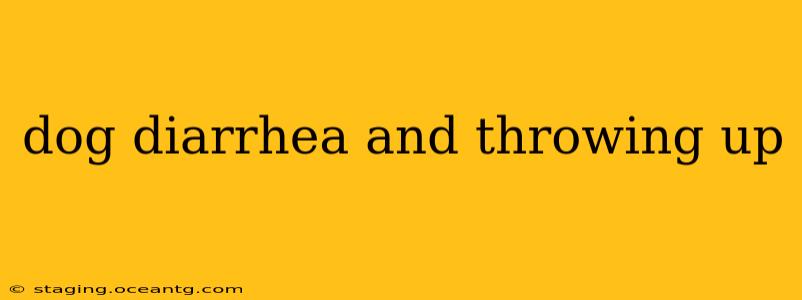Seeing your dog suffering from diarrhea and vomiting is undeniably distressing. This comprehensive guide will help you understand the potential causes, when to seek veterinary attention, and how to provide supportive care for your furry friend. We'll cover common causes, home remedies (when appropriate), and crucial preventative measures.
What Causes Diarrhea and Vomiting in Dogs?
Several factors can trigger this unpleasant combination in dogs. It's crucial to observe your dog closely to identify potential clues. Some of the most common culprits include:
- Dietary indiscretion: Eating spoiled food, garbage, or non-food items (like toys or rocks) is a frequent offender. This often leads to acute (short-lived) episodes.
- Infections: Viral, bacterial, or parasitic infections can cause severe gastrointestinal upset, leading to both diarrhea and vomiting. Parvovirus is a particularly serious example.
- Inflammatory Bowel Disease (IBD): This chronic condition causes inflammation in the digestive tract, resulting in persistent diarrhea, vomiting, and weight loss.
- Pancreatitis: Inflammation of the pancreas can severely impact digestion, causing both diarrhea and vomiting, often accompanied by abdominal pain.
- Food allergies or intolerances: Certain ingredients in commercial dog food or table scraps can trigger allergic reactions leading to gastrointestinal distress.
- Medications: Some medications have gastrointestinal upset as a side effect.
- Toxins: Ingesting poisonous substances like pesticides, cleaning products, or certain plants can cause severe vomiting and diarrhea.
- Stress or Anxiety: Changes in routine, travel, or the introduction of new pets can upset a dog's stomach.
How Long Does Dog Diarrhea and Vomiting Last?
The duration varies greatly depending on the underlying cause. Mild cases related to dietary indiscretion might resolve within 24-48 hours. However, persistent vomiting and diarrhea lasting longer than 24 hours, especially if accompanied by other symptoms, warrants immediate veterinary attention.
When Should I Take My Dog to the Vet?
Don't hesitate to contact your veterinarian if your dog exhibits any of the following:
- Vomiting and diarrhea lasting longer than 24 hours: Dehydration becomes a serious concern after this period.
- Lethargy and weakness: This suggests a more severe underlying condition.
- Blood in the vomit or stool: This indicates internal bleeding and requires urgent veterinary care.
- Dehydration (signs include dry gums, sunken eyes, loss of skin elasticity): Dehydration can quickly become life-threatening.
- High fever: A fever suggests a serious infection.
- Abdominal pain: Your dog may exhibit signs of discomfort or pain when their abdomen is touched.
- Persistent loss of appetite: Refusal to eat for an extended period can indicate a serious illness.
Home Remedies for Mild Cases (Consult your vet first!)
For mild, short-lived episodes potentially linked to dietary indiscretion, you can try the following after consulting your veterinarian:
- Withholding food for 12-24 hours: This allows the digestive system to rest.
- Offering small amounts of bland food: Plain boiled chicken and rice are often recommended. Introduce this gradually.
- Providing plenty of fresh water: Preventing dehydration is crucial.
What Can I Feed My Dog After Diarrhea and Vomiting?
Once your dog's vomiting and diarrhea subside, gradually reintroduce their regular food, starting with small, frequent meals. If you suspect a food allergy or intolerance, discuss dietary changes with your vet.
Can I Give My Dog Pepto-Bismol for Diarrhea?
No. Do not give your dog Pepto-Bismol or other human medications without explicit veterinary guidance. Many human medications are toxic to dogs.
How Can I Prevent Future Episodes?
- Maintain a consistent diet: Avoid sudden changes to your dog's food.
- Supervise your dog to prevent scavenging: Keep garbage inaccessible and prevent them from consuming non-food items.
- Regular parasite prevention: Preventative medications help control intestinal parasites.
- Maintain good hygiene: Regular cleaning of food and water bowls helps prevent bacterial contamination.
This information is for educational purposes only and should not replace professional veterinary advice. Always consult your veterinarian for any health concerns regarding your dog. Early diagnosis and treatment are essential for optimal outcomes.
